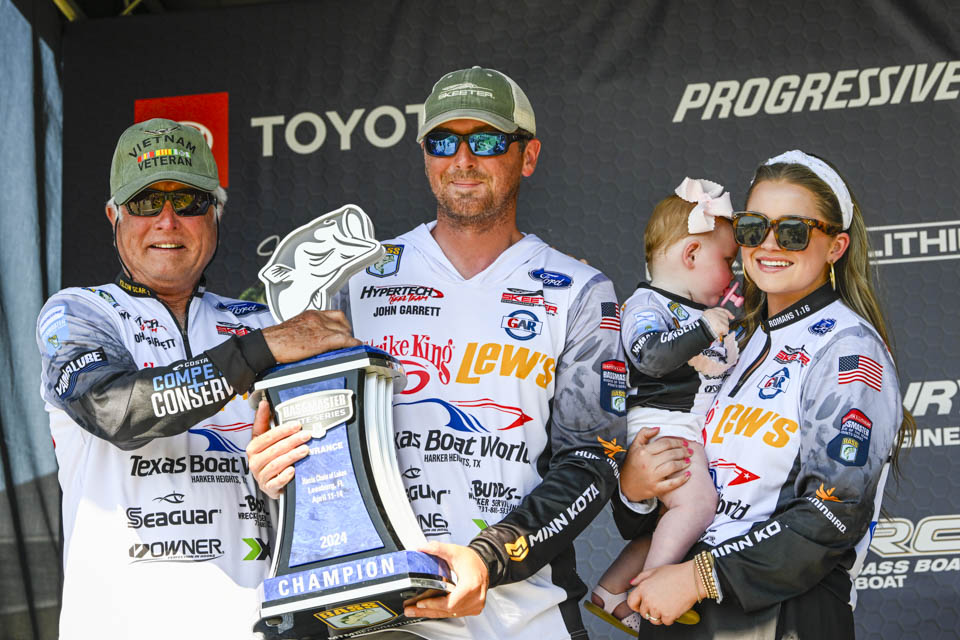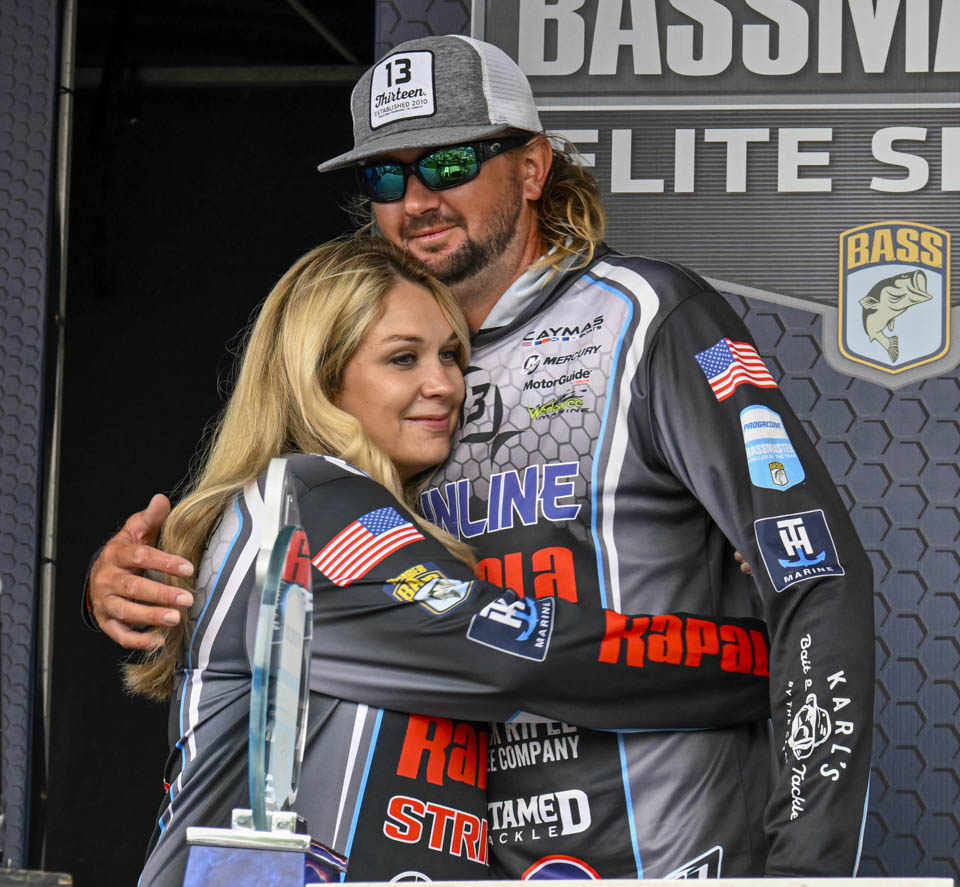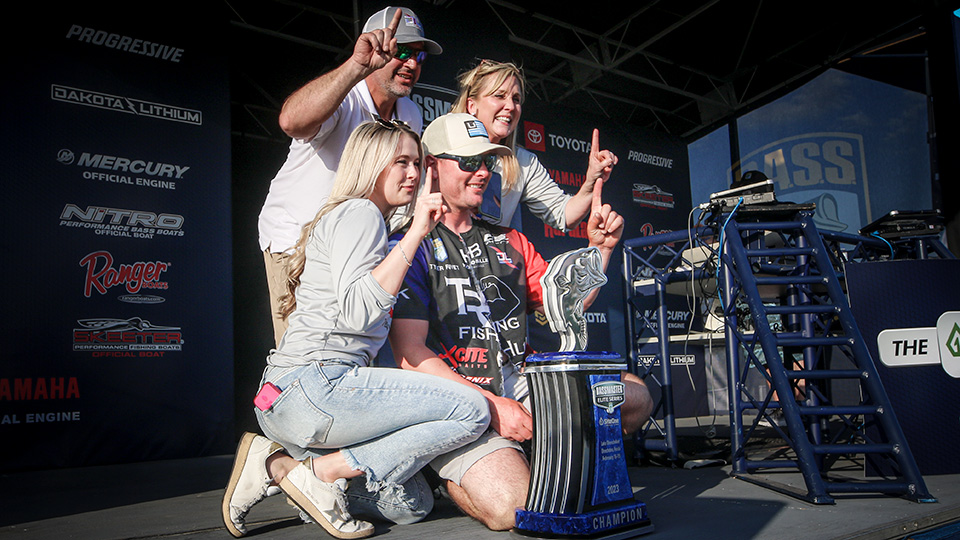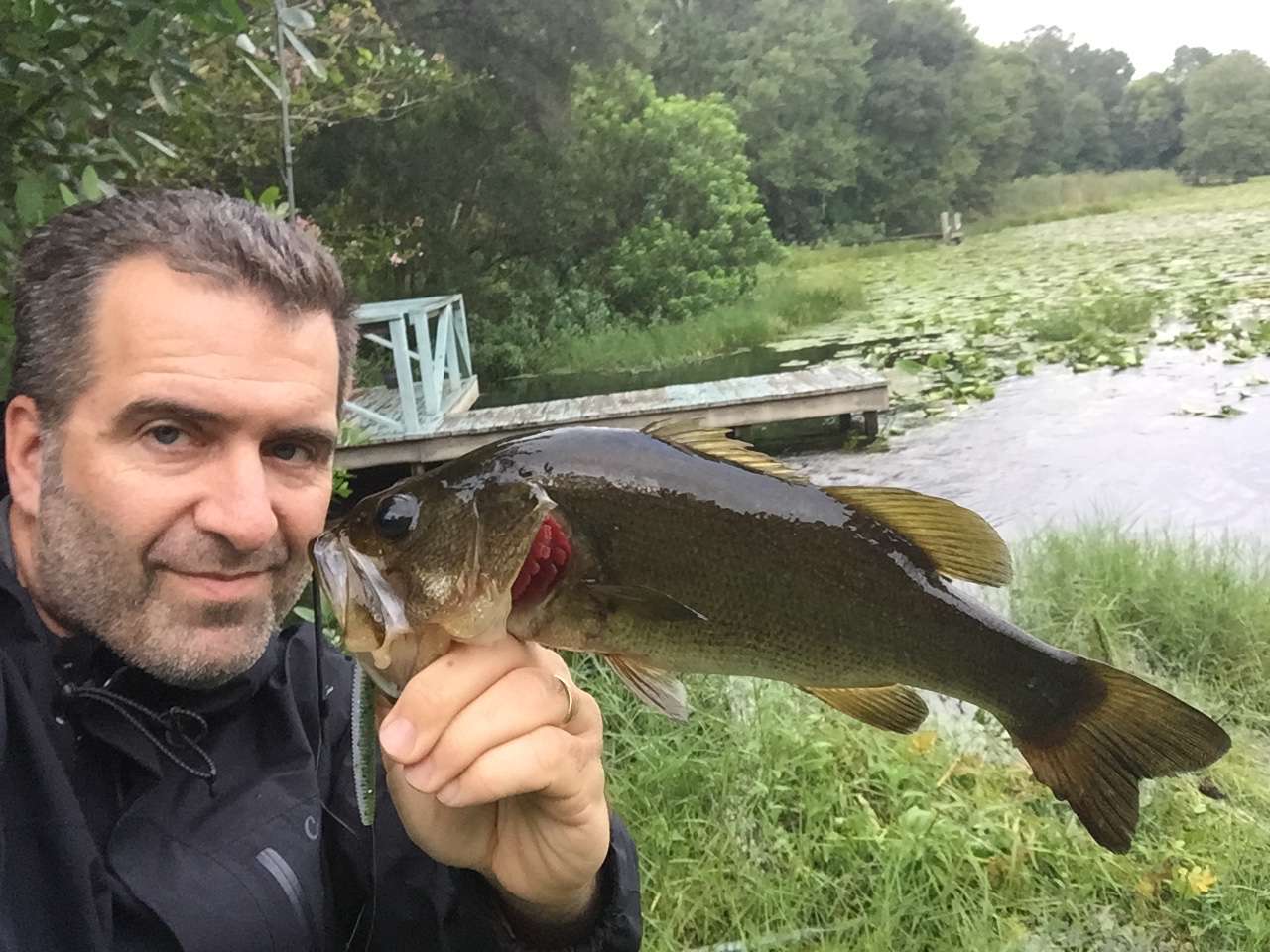
The temptation to make what would have been a reckless and likely dooming decision crossed John Garrett’s mind. Fortunately, the rookie from Union City, Tenn., staved off the nagging thoughts, stuck to his plan and claimed his first blue trophy — thanks, in large part, to a wisdom beyond his 29 years.
It was about 10 o’clock on Day 1 of the Lowrance Bassmaster Elite at the Harris Chain, and Garrett’s only legitimate option was not producing. Having located a 75-yard stretch of Lake Carlton shellbar during practice, Garrett was perplexed by the seemingly uncooperative fish clearly visible on his forward-facing sonar.
“I knew there was a population of big fish there, but I could not make them bite,” Garrett said. “I told myself to stick it out, and by doing that, I found those fish would only bite from 10:30 a.m. to 1:30 p.m.”
Tenacity would deliver a dominant wire-to-wire win by a double-digit margin. Now he’s had time to process the moment, Garrett credits his grandfather, Johnnie Garrett, for instilling in him a difference-making principle.
“There’s one thing he always stressed: ‘Never leave fish to find fish,’” Garrett recalls. “He said that a million times. Whenever I’m around them and I’m thinking about leaving, that thought runs through my head.”

Relevant relationships
Grandparents generally have a meaningful place in their grandkids’ hearts, but for several Elite pros, theirs have greatly impacted life on and off the water. Along with Garrett, two more examples merit a mention.
Tyler Rivet: The “Never Give Up” tattoo on his often-photographed right bicep partially nods to Elite veteran Mike Iaconelli, who coined the phrase during his 2003 Bassmaster Classic win. But on a deeper personal level, the ink also honors Rivet’s late grandmother Maifred Killen, whose strength and perseverance through health challenges greatly inspired Rivet.
Kyle Welcher: The pro from Opelika, Ala., acknowledges how his professional poker career significantly influenced a strategic mindset that delivered the 2023 Bassmaster Angler of the Year title. Welcher attributes this to his grandmother, Anna Guess, who taught him the strategies of Texas Hold ‘Em during his youth. Over the years, card games created the generational bridge by which Welcher was able to remain close with his grandmother.
For Garrett, the relationship finds childhood roots, as his grandfather would pick him up nearly every weekend to fish a local pond. Fishing lessons melded with life lessons, all within the framework of mutually cherished memories.
Later, the elder Garrett served as his grandson’s boat captain during his Bassmaster High School Series years and partnered with him for Reelfoot Lake Bass Club events on Kentucky and Pickwick lakes. Notching a few local wins, the duo travelled and practiced together for three years on the Bassmaster Opens.
Many were the meaningful moments, and we’ll get into that in a moment, but describing the benefit of spending so many of his competitive years with a close relative, Garrett said: “Just knowing you have someone that supports you and does not think you’re crazy for chasing those slimy, stinky fish across the country was a big help.
“When I made the Elites, he said, ‘Sucks that we won’t be traveling together anymore, but just do you.’”
Shared knowledge
Taking nothing away from Garrett’s clear talents and dogged determination, there’s no denying the foundational learning opportunities the early years with his grandfather provided. Through the good-natured competition inherent to fishing buddies of any age, they often disagreed on site selection and tactics, but cross-generational flexibility always prevailed.
“He already had a lot more bass fishing experience than I did, and I was gathering information from watching the Elite TV shows and YouTube,” Garrett said. “I still do things today that he taught me and if I learned something that worked out he still does it. It was a good mix.”
Specifically, Garrett said his grandfather’s a master at tuning topwater prop baits and deep-diving crankbaits — both valuable skills for his Elite competition. Also, the rule for Carolina rigs was always: No glass beads and always use monofilament leaders to float the bait.
On the flip side, during Garrett’s high school years, he embraced the drop-shot teachings of the late Aaron Martens. While the lightweight rig had his decidedly old-school grandfather wrinkling his brow, Garrett’s immediate and ongoing success proved eye-opening.
“He learned to fish a drop shot pretty quick after a couple trips,” Garrett chuckled.
Learning to adapt and overcome
While pleasant times occupy the majority of Garrett’s memories, some of the most important lessons came disguised as adversity. Until about four years ago, Johnnie Garrett owned Union City Marine — the dealership/service center where he still works. Boats were always available, but as John said, reliability frequently floundered.
“My granddad, for the longest time, never owned a boat, and we would use a lot of trade-in boats from the marina,” he said. “He was notoriously bad about taking people’s word that the boat would run.
“I can’t tell you how many times we’d be out there and the boat wouldn’t run.”
Quick note to clarify: Garrett’s not complaining. He saw those experiences for what they were — teachable moments. For one thing, he learned impromptu boat repair. More importantly, he learned adaptation.
“During a high school championship on Nickajack Lake, we got out there and the boat wouldn’t run,” Garrett said. “But rather than get down, we found a couple of schools within trolling motor distance of the ramp and placed second.”
With this and other challenges, like the time intermittent outboard failures made a big-waves kinda day pretty sketchy, Garrett said he treasures those colorful experiences. The takeaway: Survive and thrive.
“As far as adversity, just go with it and do everything you can to right the ship,” he said. “There were very few times when the boat ran well and we caught lots of fish and came back.
“The times that seem like they go smoothly are great, but we ended up talking more in the future about the times that didn’t go smoothly. I think they make better memories.”
The tough times also prepared a young John Garrett for what his adult years often present.
“Now, when those (difficult) times happen, you don’t go into panic mode, you act calm, cool and collected,” he said. “When those things happen, bells go off in my head about what I need to do.”

Life on the road
Balancing the serious stuff, Garret offers these upbeat nuggets from his time of traveling and fishing with his grandfather.
Tunes: “My granddad hates music in the truck; he doesn’t like a lot of noise. Thankfully, he doesn’t hear well, so I would play my country music like George Strait or Chris Stapleton really low.”
Mealtime: “If there was a Cracker Barrel within 20 miles, that’s where we were eating. He’d get the daily special every time.”
Attitude: “My granddad was always in a good mood and never looking down. When it comes to the outdoors, he never showed any negativity. I think I picked that up from him.”
Coming full circle
Elite winners typically bring family and significant others up for the blue trophy celebration, and Garrett wasn’t about to miss his moment. When Johnnie Garrett stood by his Elite champion grandson on that Harris Chain stage, the moment solidified a success story long in the making.
“We spent so much time together bass fishing, it’s like all that time we put into it paid off,” John Garrett said. “I feel like when he sees me succeed, he sees what we did on the water 15 years ago and how it’s all come together.”
So, what did the elder Garrett tell his grandson when he joined him for the blue trophy celebration?
“He said, ‘I knew your time would come,’” John Garrett recalled. “I had been so close to making the Elites and winning tournaments, I feel like he had worked just as hard for that as I had.”





